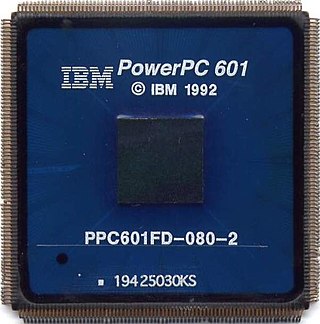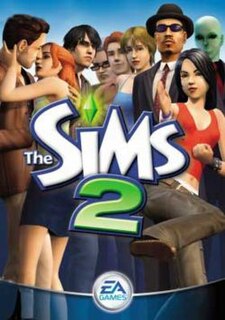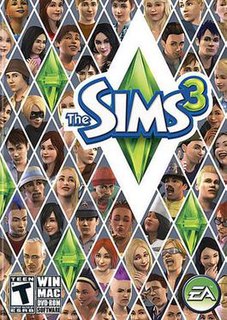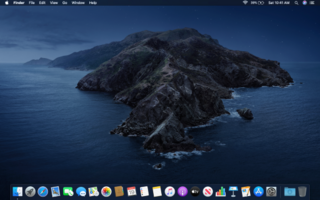macOS is a series of proprietary graphical operating systems developed and marketed by Apple Inc. since 2001. It is the primary operating system for Apple's Mac computers. Within the market of desktop, laptop and home computers, and by web usage, it is the second most widely used desktop OS, after Microsoft Windows.

PowerPC is a reduced instruction set computer (RISC) instruction set architecture (ISA) created by the 1991 Apple–IBM–Motorola alliance, known as AIM. PowerPC, as an evolving instruction set, has since 2006 been named Power ISA, while the old name lives on as a trademark for some implementations of Power Architecture–based processors.
The history of macOS, Apple's current Mac operating system originally named Mac OS X until 2012 and then OS X until 2016, began with the company's project to replace its "classic" Mac OS. That system, up to and including its final release Mac OS 9, was a direct descendant of the operating system Apple had used in its Macintosh computers since their introduction in 1984. However, the current macOS is a Unix operating system built on technology that had been developed at NeXT from the 1980s until Apple purchased the company in early 1997.

SimCity 4 is a city-building simulation computer game developed by Maxis, a subsidiary of Electronic Arts. It was released on January 14, 2003. It is the fourth major installment in the SimCity series. SimCity 4 has a single expansion pack called Rush Hour which adds features to the game. SimCity 4: Deluxe Edition contained the original game and Rush Hour combined as a single product.

The Sims 2 is a 2004 strategic life simulation video game developed in Redwood City, California studio of Maxis and published by Electronic Arts. It is the sequel to The Sims.

Connectix Corporation was a software and hardware company, noted for having released innovative products that were either made obsolete as Apple Computer incorporated the ideas into system software, or were sold to other companies once they became popular. It was formed in October 1988 by Jon Garber; dominant board members and co-founders were Garber, Bonnie Fought, and close friend Roy McDonald. McDonald was still Chief Executive Officer and president when Connectix finally closed in August 2003.

Aspyr Media, Inc. is an American video game developer and publisher founded by Michael Rogers and Ted Staloch in Austin, Texas. Originally founded to bring top gaming titles to macOS, the company, since 2005, has become a publisher and developer of entertainment for multiple gaming platforms.
Mac gaming refers to the use of video games on Macintosh personal computers. In the 1990s, Apple computers did not attract the same level of video game development as Microsoft Windows computers due to the high popularity of Microsoft Windows and, for 3D gaming, Microsoft's DirectX technology. In recent years, the introduction of Mac OS X and support for Intel processors has eased porting of many games, including 3D games through use of OpenGL and more recently Apple's own Metal API. Virtualization technology and Boot Camp also permit the use of Windows and its games on Macintosh computers. Today, a growing number of popular games run natively on macOS, though as of early 2019, a majority still require the use of Microsoft Windows.

The Sims 2: Seasons is the fifth expansion pack for The Sims 2. It was developed at the Redwood Shores studio of Maxis and was released on March 1, 2007 in North America, and was followed by the European release on March 2, 2007. Aspyr released a Mac OS X port of the game in June 2007.

The Sims 3 is a life simulation video game developed by the Redwood Shores studio of Maxis and published by Electronic Arts. Part of The Sims series, it is the sequel to The Sims 2. It was released on June 2, 2009 for OS X, Microsoft Windows and smartphone versions. Console versions were released for PlayStation 3, Xbox 360, and Nintendo DS in October 2010 and a month later for Wii. The Windows Phone version was released on October 15, 2010. A Nintendo 3DS version, released on March 27, 2011, was one of its launch titles.

The Sims Castaway Stories is the third and final game in The Sims Stories. It was released on January 29, 2008, with a port for Mac OS X released by Aspyr on March 17, 2008.

The Sims Pet Stories is the second game released in The Sims Stories series. Following The Sims Life Stories (2007), The Sims Pet Stories was released on June 19, 2007.
Linux gaming refers to playing video games on the Linux operating system.
SimCity is an open-ended city-building video game series originally designed by Will Wright. The first game in the series, SimCity, was published by Maxis in 1989. The success of SimCity sparked the creation of several sequels and many other spin-off "Sim" titles, including 2000's The Sims, which itself became a best-selling computer game and franchise.

The Sims 2: Open for Business is the third expansion pack for The Sims 2, released on March 3, 2006, which allows Sims to run a home or community lot based business. Aspyr released a port of the game for Mac macOS on September 4, 2006. Although it is not a direct reimagining of Open for Business, The Sims 3: Ambitions introduces a related theme of following playable sims to work and creating salable items using numerous skills.
The App Store is a digital distribution platform for macOS apps, created and maintained by Apple Inc. The platform was announced on October 20, 2010, at Apple's "Back to the Mac" event. Apple began accepting app submissions from registered developers on November 3, 2010, in preparation for its launch.

BlueStacks is an American technology company that produces the BlueStacks App Player and other cloud-based cross-platform products. The BlueStacks App Player is designed to enable Android applications to run on PCs running Microsoft Windows and Apple's macOS. The company was founded in 2009 by Jay Vaishnav, Suman Saraf, and Rosen Sharma, former CTO at McAfee and a board member of Cloud.com.

The Sims 4 is a 2014 life simulation video game developed by the Redwood Shores studio of Maxis and published by Electronic Arts. It is the fourth major title in The Sims series and was originally announced on May 6, 2013. It was released in North America on September 2, 2014, for Microsoft Windows. A Mac-compatible version of the game was released on February 17, 2015. The Sims 4 is the first PC game to top all-format charts in two years. The game has received mixed reviews since its release, with the majority of criticism directed towards its lack of content.

macOS Mojave is the fifteenth major release of macOS, Apple Inc.'s desktop operating system for Macintosh computers. Mojave was announced at Apple's Worldwide Developers Conference on June 4, 2018, and was released to the public on September 24, 2018. The operating system's name refers to the Mojave Desert and is part of a series of California-themed names that began with OS X Mavericks. It succeeded macOS High Sierra and was followed by macOS Catalina.

macOS Catalina is the sixteenth major release of macOS, Apple Inc.'s desktop operating system for Macintosh computers. It is the successor to macOS Mojave and was announced at WWDC 2019 on June 3, 2019 and released to the public on October 7, 2019. Catalina is the first version of macOS to support only 64-bit applications and the first to include Activation Lock. It is also the last version of macOS to have the version number prefix of 10. Its successor, Big Sur, is version 11. macOS Big Sur succeeded macOS Catalina on November 12, 2020.














